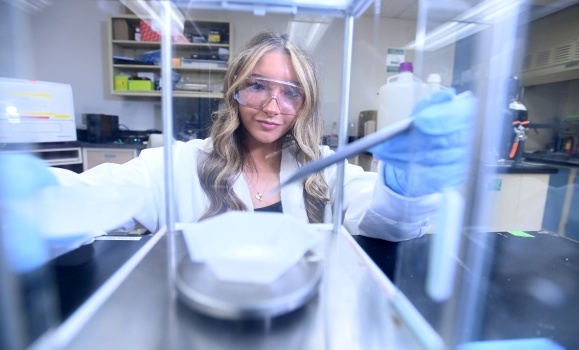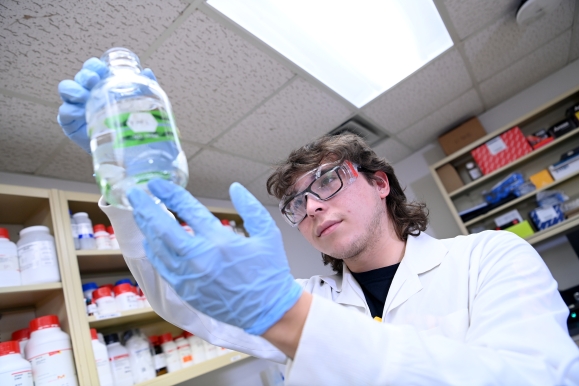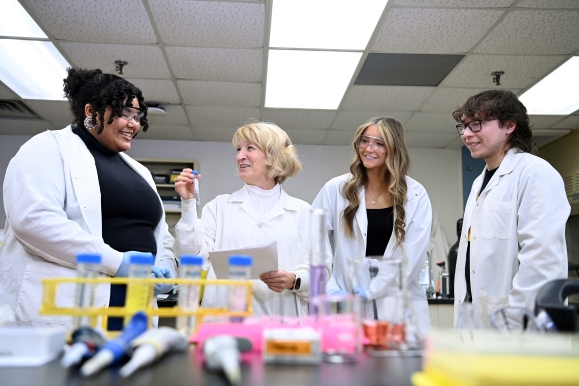A decade of impact
» Go to news mainCelebrating 10 Years of Dalhousie’s Medical Sciences program

One of the most sought-after programs at all of Dalhousie University is celebrating its tenth year.
The Medical Sciences program, which at inception was the first and only of its kind in the Atlantic Provinces, attracts more than 1,300 applications to fill its 120 seats each year. Its popularity is only surpassed by Dalhousie’s nursing and medicine programs.
Students vying for one of the coveted seats have exceptional high school averages.
It's no surprise that each of them excels, with many going on to plastic surgery residencies, pharmacy, others completing PhDs, and countless others heading into other impressive careers. Seeing where they end up fills both Assistant Dean, Medical Sciences Dr. Sarah Wells, and Program Manager Dr. Julie Jordan, with pride.
“We see so much energy and enthusiasm every year with the incoming class, and we’re always proud when they leave the program,” says Dr. Wells. “We often get teary at convocation, watching them graduate—it feels like seeing your own kids grow up.”
Empowering pathways in health and science
The Medical Sciences program, housed in the Faculty of Science, but connected to the Faculties of Medicine and Arts and Social Sciences, provides graduates with a broad biomedical science background, preparing them for professional programs, graduate studies, or careers in biotechnology and government.
“It's unlike any other Bachelor of Science program in the region, offering a focus on human health and physiology, including psychosocial components often overlooked in pure science programs,” says Dr. Wells. “It prepares them for further training, primarily in medical school, but also in graduate studies and other professional programs.”
Eshan Arora graduated from the Medical Sciences program in May 2024 and is in his first year of medical school here at Dalhousie.
“The Med Sci program includes a broad range of courses that align perfectly with what we’re doing in medical school,” he says. “Up until now, there hasn’t been much new material for me because I’ve already covered it in my Med Sci courses. While my peers might be encountering this content for the first time, it’s familiar to me.”
The Medical Sciences program is designed for flexibility, especially in its senior-year offerings. About two-thirds of students opt for an honours degree, completing a year-long research project in their final year. They can work with a variety of experts across clinical, theoretical, or applied fields, engaging with topics from emergency medicine to environmental racism. For others, the innovative capstone course presents a unique alternative, analyzing diverse medical cases, adapting annually to emerging healthcare issues.
For Eshan’s honours project, he developed and taught a first-year class for underrepresented students in STEMM (Science, Technology, Engineering, Math, and Medicine). His goal was to provide them with access to the hidden curriculum—those unwritten rules and resources that people with generational knowledge of university life might already have.
“We wanted to create a community where students could support each other, especially those who might experience imposter syndrome,” says Eshan. “Working with the United Nations Women in STEMM Ambassador and Dal’s Office of Equity and Inclusion, my research analyzed the class’s impact on students.”
Initially uncertain if his project fit within medicine, Eshan now appreciates how it encompassed psychology, student well-being, and mental health. He’s grateful for the Medical Sciences program’s exceptional flexibility, enabling honours research beyond traditional medical fields.
More than medicine
Dr. Sean Wang is in his first year of family medicine at the University of Toronto. A graduate of the Medical Sciences program, and Dalhousie Medicine, he recognizes that his medical sciences undergraduate training provided unique benefits, including courses tailored to medical school entrance exam requirements. The program’s encouragement to volunteer also played a key role in guiding him towards a career in medicine.
“Volunteering at the IWK family room at the Ronald McDonald House was a huge part of my undergrad, and it culminated in realizing that I wanted to work in healthcare and liked the medicine part of it, so I decided to go for it.”
Though he notes the program was tough, the community of peers and faculty that developed around him was critical to his success.
“The ongoing support from professors like Dr. Jordan and Dr. Wells, who checked in on us, was invaluable. All that exposure to the medical school environment really prepped me for what was to come.”
Though both Eshan and Dr. Wang did pursue careers in medicine, not all those in medical sciences choose that path. Many graduates go into other fields like physiotherapy, dentistry, or even law. Approximately 70 per cent of students beginning the program indicate they want to be doctors, but the interdisciplinary nature of study exposes students to different fields and leads many to other careers.
“We're not just a pre-med program; we're training future scientists,” says Dr. Wells. “A lot of students also go into pharmacy—around 20 per cent, and it's an important pipeline for careers in research.”
Increased representation
In 2022, the Inclusive Pathways to Medical Professions (IPMP) initiative was introduced to increase representation of Indigenous and African Nova Scotian students in the Medical Sciences program by admitting 10 Mi'kmaq and 10 African Nova Scotian students annually. Each cohort has dedicated support led by advisors from these very communities. The third cohort of IPMP students began their studies in September.
“This initiative has significantly increased diversity in the program, and created a cohesive community that makes students feel welcome and included,” says Dr. Wells. “We now have wrap-around supports in place, such as counseling, tutoring, and financial support and I know several students who wouldn’t still be at Dalhousie without this.”
The heart of the program
The success of the Medical Sciences program depends heavily on relationship-building with other faculties, deans, and instructors, something Dr. Wells is incredibly grateful for.
“This program runs out of the goodness of people’s hearts, and that’s not something you find at every institution,” she says. “I'm especially thankful to the Deans of Medicine and Science for their continued support, which is the reason this is all possible.”
And while she shows her gratitude, the students reciprocate with their own appreciation for her and Dr. Jordan, whose unwavering support and approachability create an environment where learners thrive.
“Dr. Jordan did the work of three people without ever showing the strain,” recalls Eshan. “Dr. Wells, too—she’s so dedicated and genuine, and is always going above and beyond. It's been a pleasure to not only take the degree, but also get to know and work with people like her.”
With evolving coursework and strong support from faculty like Drs. Wells and Jordan, there’s no doubt the Medical Sciences program will continue to shape diverse future leaders in medicine, science, and beyond for many decades to come.
Recent News
- The Cape Breton Medical Campus opens its doors
- Dalhousie team advances epilepsy outreach in Zambia
- Eskasoni Doctor to Serve as Academic Director at Cape Breton Medical Campus
- Canadian Medical Hall of Fame Award for Students: Jeremiah Philips
- Dal’s 2025 research awards
- Six accomplished individuals honoured as notable Dal alumni
- New hope for for Fabry patients
- New associate dean, UGME, Dr. Ian Epstein’s vision for medical education


